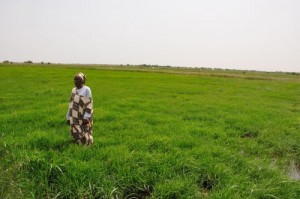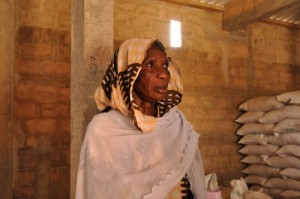Hard work in the river valley

Wednesday I was in a truck screaming around a flood plain near the Senegal River not far from the Mauritania border. We were on a maze of dirt tracks, so utterly confusing that I lost track of where we were going and where we’d been. Even the farmers I was with seemed to have trouble deciding when to try to blast across a drained, muddy irrigation channel, or drive around channels flowing with river water feeding the green fields. We hit several dead ends, and had to retrace our steps amid loud discussions in Wolof about our route.
Our driver was Ibrahima Ly, who is the coordinator for an organization called PINORD, a French acronym for “Program d’Appui aux Initiatives du Nord” or roughly Program of Support for Northern Initiatives. Oxfam has been supporting PINORD since massive floods destroyed rice production in the valley in 2003.
Ly seemed to be having a blast. “This is just like the Paris-Dakar rally” he said at one point as our truck leapt over a small irrigation channel, practically airborne for an instant. We ground to a halt near the field of Ndeye Gaye, a 50-something-year-old farmer and leader of women in her community of Ross Bethio.
She’d been expecting us, and presumed our late arrival was due to the near inaccessibility of her field. She says it’s really hard to move her inputs (seeds, tools, fertilizer) out to the field, and ship her harvested rice back out. And if this delays planting during the spring irrigated season, her rice might not mature in time for harvest, delaying the next rainy season planting and putting her business at risk.
She says she overcomes this challenge by working hard—and you have to respect her for it. Hard work came up over and over again as I talked with these northern-Senegalese rice farmers, who were working with PINORD. Quite simply, working hard is not enough. You have to work better, with the right seeds and marketing expertise, and use smart tactics to overcome the challenges of low-priced imported rice, drought, insects, and lack of knowledge.
Gaye says PINORD has helped her and thousands of others with training. “We’ve learned to select quality seed, to grow quality rice. How to use the right fertilizer, how much and when. How to track our expenses, how much you need to sell to make a profit. How to get credit and use it the right way, so you can make proper financial plans and avoid bad debt.”
She says she used to get 40 bags of rice from each of her five hectares, but now she gets 70 bags, and wants to keep improving, expanding her land and business as she goes.

Her neighbor Mame Bassine Gaye (a common name here, and probably no relation), 55, says the women of Ross Bethio, in the Senegal River valley region, known as Walo, are particularly hard workers. She is proof: she has amassed 50 hectares, has her own processing facility, two trucks, and an ample home compound filled with family. “PINORD has changed a lot here, and you can see how well women can do. If we did not work hard you would not see this.
If a Walo woman falls down, it is because she is working hard—you just have to help her get back up.”